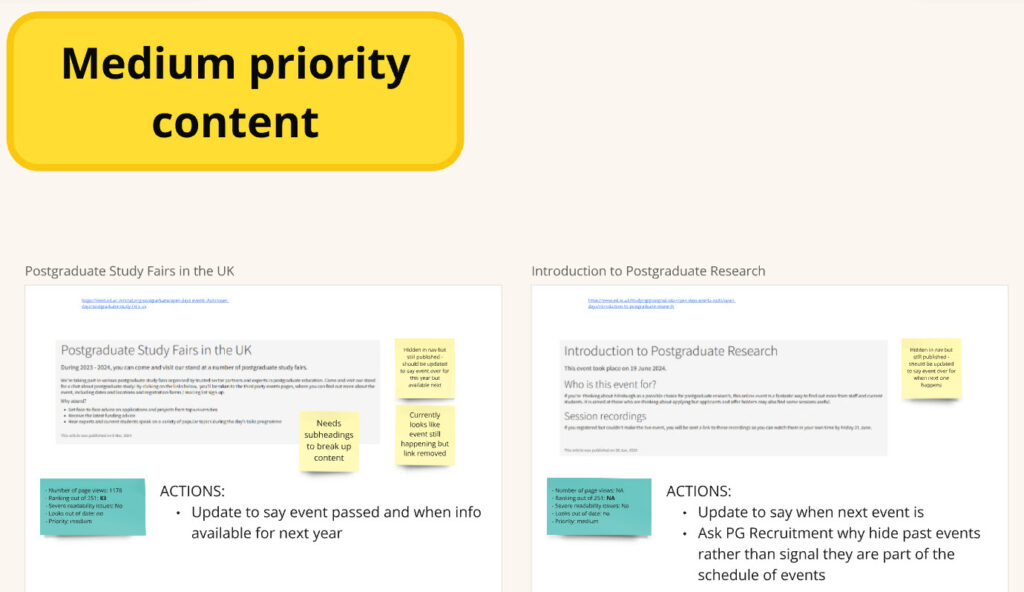The impact of auditing content owned by multiple teams
We audited postgraduate study website content this summer and worked with colleagues responsible for it to follow our audit findings around consolidating and improving our web estate.
Background
Our team is the owner of central studying site content at the University, but we do not currently manage all the subsites within the domain.
As part of our postgraduate study website content audit this summer, we looked at two sites run by other teams:
- Open days, events and visits (run by the Postgraduate Recruitment team)
- Online learning (run by the Online Learning Marketing team)
Currently, these teams are both responsible for the creation and maintenance of this content and accountable for its accuracy. However, we are evolving our content responsibility to a situation where our team becomes responsible for the management of all central prospective student content, and the relevant teams who currently own this content become only accountable for its accuracy and relevance to business needs.
Content responsibility is often assigned in a matrix model known as RACI as it outlines who is responsible versus accountable for content, as well as who should be consulted and informed about content.
The RACI assignment matrix explained (Smashing Magazine article by Paul Boag)
Evolving our RACI matrix this way will allow our team to create and manage a more consistent prospective student web estate. By removing this responsibility from other teams, it will help free up their time to focus on the services they run.
While we are not yet at a point where we can take over responsibility for this content, auditing these subsites is an initial step towards getting a better understanding of these content areas and making recommendations to improve it.
Audit method
Our auditing method consisted of looking through every page on the sites and assessing things like:
- content readability, formatting and adherence to our style guide
- if content was redundant, out-of-date or trivial
These assessments were logged on a spreadsheet to capture high-level information and actions for pages. We also used Miro, a digital whiteboarding tool, to post screenshots of the pages and make notes on them.

Our postgraduate study content audit featured a Miro board with screenshots of pages and comments with our assessment of them.
What we found in the audit
When we audited these sites, we found that they each had one overarching issue to address.
On the Open days site, there were lots of out-of-date pages. Being an event-based site, we found that at least half of the content was related to recruitment events that happened over a year ago. Prior to the audit, we had confirmed with the Postgraduate Recruitment team that they were not looking to keep content related to events that happened more than a year ago.
On the Online learning site, we found that lots of the content was a duplicate of content on the main postgraduate study site. Only a subset of pages had content that was unique to the online student experience.
From these findings, our primary recommendations to site owners were to:
- remove out-of-date pages to consolidate site size on the Open days site
- incorporate the unique online learning content into the main postgraduate study site to reduce content management overhead and avoid duplicate content
Following our recommendations
Following the audit, we turned the insights about each site into a high-level summary and recommendations document we could share with the two teams.
We were pleased to learn the Postgraduate Recruitment team immediately worked through our recommendations, removing 133 pages of out-of-date content from their site.
Additionally, the Online Learning Marketing team has agreed with our recommendations to incorporate unique content into the central postgraduate study site. We aim to do this as part of our redevelopment of the postgraduate study site, happening alongside the launch of the new postgraduate degree finder in October 2025.
The importance of auditing
It was encouraging to see our collaborators in these teams be so responsive and open to the recommendations in our audit findings summaries. This shows the impact and importance of auditing content owned by different teams. Even though we currently do not manage these subsites, auditing them has meant we can make meaningful improvements to the content now, in preparation for a future where we are responsible for it.
Especially in cases where subsites are run by service owners who are not content specialists, auditing lets us use our expertise in this area to help colleagues understand and follow best practice in digital content.
Moreover, following our recommendations to remove and consolidate content means that we are:
- reducing site management time for the current site owners and our future selves
- improving navigation of the central study site and search results for students
- reducing the carbon footprint of our web estate
While auditing websites can feel like a time-consuming and laborious process, it’s time well spent to help us get a better grip of our web estate and make changes to improve the prospective student experience.
Need advice on auditing your content?
I’ve improved a lot about how our team conducts content audits over the years, including making our audits more visual and less focused on spreadsheets. If you have an audit coming up, feel free to contact me for advice on how to run it.



